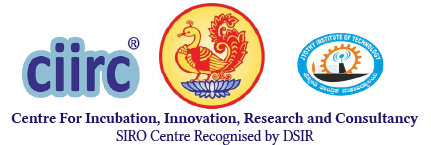Overview
Research Focus
Select Publications
Facilities
Projects
Research Staff
Overview
This group focuses on the applications of enzymes, enzyme inhibitors, nanomaterials and biosensors in the food, health, biotech and environmental areas. The focus and problems being addressed are described below.
Research Focus
Improving the thermostability of maltogenic alpha amylase of Aspergillus niger by using negative pressure
The maltogenic alpha amylase is helpful in the production of maltose from starch. But this enzyme is stable only up to 40°C, which limits its usage in the processing of starch. Calcium can stabilize the enzyme up to 50°C and this can be further be improved upto 70°C, by using negative pressure.

Improving the activities of pectinase and partially saturated canthaxanthin (PSC) produced by Aspergillus carbonarius by using nano approaches
Pectinase has been used for the fruit juice clearance and oil extraction. Partially saturated canthaxanthin has been used as food colour and it was reported to show anticancer and antioxidant activities. When both the metabolites treated with carbon nanotubes (CNTs), they have been showing significantly high activities.
Enhancing the functionality of Methotrexate (MTX) degrading enzyme from Variovorax paradoxus by using nano approaches
Methotrexate degrading enzymes are required to overcome the toxicity of the methotrexate while treating the cancer. The enzyme from Variovorax paradoxus converts the methotrexate in to non-toxic products. Methotrexate degrading enzyme from V. paradoxus is a dimeric protein with a molecular mass of 46 KDa. Enzyme nanoparticles can degrade methotrexate faster than the native enzyme and they show lower Km compare to the native enzyme. Enzyme nanoparticles show better thermal stability and they are found to be stable for much longer time in the serum compare to the native enzyme. Enzyme nanoparticles show better functionality than the native enzyme while clearing the methotrexate added to the serum suggesting their advantage over the native enzyme for the therapeutic and biotechnological applications.

Identification and isolation of Lipase inhibitors from Streptomyces Spp.
Orlistat is the only commercially available lipase inhibitor for the treatment of obesity. But it has side effects like gastric problems, acute kidney injury and acuteoxalate nephropathy. Hence, there is a need to explore for new inhibitors. Streptomyces spp (Fig.4) are being explored for inhibitors and new autobiographic method has been developed (Fig.5) for detecting lipase inhibitors.

Bioremediation of toxic textile dyes by using bilirubin oxidase enzyme
One of the major contributors for water pollution is textile dyes and some of them are carcinogenic. It has been found that bilirubin oxidase enzyme from the fungus Myrothecium verrucaria can degrade the textile dye, reactive blue 25 significantly suggesting the usage of this enzyme for the polluted water remediation.

Development of enzyme nanobiosensor for the detection of ammonium
Ammonia is one of the toxic contaminant of air, water and food. It is injurious to the health and its monitoring is important to avoid tragedies. An ammonia biosensor based on the enzyme alanine dehydrogenase is developed, which is highly specific and responds to broad range of ammonium concentrations. Multiwalled carbonnanotubes are found to enhance the response and sensitivity of the ammonia biosensor.

Select Publications
Purification and characterization of Alanine dehydrogenase from Streptomyces anulatusfor its application as a bioreceptor in biosensor. Dave UC, Kadeppagari (2017) FEMS Microbiology Letters In press IF: 1.76.
Improvement of bilirubin oxidase productivity of Myrothecium verrucariaand studies on the enzyme overproduced by the mutant strain in the solid-state fermentation. Bayineni VK, Suresh S, Sharma A, Kadeppagari (2017) The Journal of General and Applied Microbiology. In press IF: 0.9.
Glycerol improves the productivity of the lipase inhibitory activity of Streptomyces coelicolor.Suresh S, Bayineni VK, Kadeppagari (2017) International Journal of Pharmacy and Bio Sciences. In press
Characterization and kinetics of the lipase inhibitory activity of Streptomyces tendae. Singh G, Bayineni VK, Kadeppagari, RK.(2017) International Journal of Pharmacy and Bio Sciences 8(2): (B) 270-274.
Sensory evaluation of kokum drinks by fuzzy logic and a simple method. Sahu CK,Kadeppagari (2017) International Journal of Food Properties 20:2608-2615. IF: 1.58
Multiwalled carbonnanotubes enhance the response and sensitivity of the ammonium biosensor based on alanine dehydrogenase.Dave UC, Ingale DV, Venkatesh K, Bayineni VK, Kadeppagari (2016) Journal of Electroanalytical Chemistry 784:102-108. IF:2.84
Production of therapeutic methotrexate degrading enzyme and studies on its nanocomplexes with human serum albumin. Bayineni VK, Kadeppagari(2016) International Journal of Pharmacy and Pharmaceutical Sciences 8:41-44.IF:1.47
The 46 kDa dimeric protein from Variovorax paradoxusshows faster methotrexate degrading activity in its nanoform compare to thenative enzyme. Bayineni VK, Venkatesh K, Sahu CK, Kadeppagari (2016) Enzyme and Microbial Technology 85:38-43. IF:2.93
Facilities
Freeze dryer, -80 and -200C Freezers, Tip Sonicator, Electrophoresis unit, Rotary evaporator, Cooling centrifuge, BOD incubator, Laminar Air Flow etc.
Projects
Remediation of hazardous dyes by integrating biotechnological methods with radiations- SSPS
Improving the functionalities of food and health related metabolites by using nano approaches-SSPS
Nano CLEAs (cross linked enzyme aggregates) for therapeutic applications-SSPS
Ionizing radiations for improving the shelf life of fruits by delayed ripening-SSPS
Development of nanobiosensors for the detection of food adulterants and health related metabolites or agents-SSPS
Lipase inhibitors and their applications in food and health sectors-SSPS
Solid state fermentation for the production of novel metabolites from fungi-SSPS
Research Staff

Dr.Ravi Kumar Kadeppagari obtained his education from the premier institutes of India, such as, Regional Institute of Education (Constituent of NCERT), Pondicherry Central University, Central Food Technological Research Institute (Constituent of CSIR). He has overseas postdoctoral experience at Northwestern University, Chicago and LSU Health Sciences Center, New Orleans, USA. He has been the recipient of the Young Scientist Research Grant from DST- SERB, New Delhi and completed projects from DRDO, DST and MOFPI. He played a major role in setting up Food Technology Division at Jain University by obtaining an infrastructural grant from Ministry of Food Processing Industries, New Delhi. He is the Editorial Board Member of American Journal of Bioscience & Bioengineering; Associate Editor of Journal of Analytical & Pharmaceutical Research and invited Guest Editor of Protein & Peptide Letters. He is an active reviewer for the SCI/SCOPUS indexed international journals like Starch, Current Microbiology, International Journal of Food Science & Technology, Journal of Separation Science, Journal of Chromatography-B, International Journal of Pharmacy & Pharmaceutical Sciences, Phytochemical Analysis, Journal of Electroanalytical Chemistry and FEMS Microbiology Letters. He is a Biotechnology consultant at international consulting agencies such as ‘Zintro’ and ‘Acabiz’.
He has various research publications in the Scopus and SCI indexed international journals and patents to his credit. Currently he is supervising one doctoral student and has already supervised three doctoral and four master’s students. He is a life member of Society of Biological Chemists, Association of Microbiologists of India, Indian Science Congress Association, Luminescence Society of India and Institute of Smart Structures & Systems. He served as the Chairman of Board of Examiners, Food Technology, Jain University and the recipient of achievement award for his research contributions from Jain University Trust. He is also the recipient of Junior and Senior Research Fellowships from CSIR, New Delhi. He is currently working as a Professor at the Centre and his current research focuses on the applications of enzymes, enzyme inhibitors, nanomaterials and biosensors in the food, health, biotech and environmental areas.
Email Id: ravikumar.k@ciirc.jyothyit.ac.in
